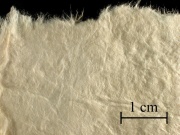Difference between revisions of "Mitsumata"
Jump to navigation
Jump to search
(username removed) |
|||
| Line 2: | Line 2: | ||
== Description == | == Description == | ||
| − | The [ | + | The [[bast fiber]] obtained from the bark of a shrub, ''Edgeworthia gardineri'' (formerly ''Edgeworthia papyrifera''), that is native to Asia and cultivated in Japan. Mitsumata has been used for [http://cameo.mfa.org/materials/fullrecord.asp?name=paper paper] since about 1600 CE. It is one of three main fiber types used for making [http://cameo.mfa.org/materials/fullrecord.asp?name=Japanese%20paper Japanese paper]. The soft, absorbent fibers produce a paper that is weaker and less absorbent that [http://cameo.mfa.org/materials/fullrecord.asp?name=kozo kozo]. Mitsumata paper also tends to shrink and expand with moisture content. |
[[File:mitsumata_proc_det.jpg|thumb|Mitsumata]] | [[File:mitsumata_proc_det.jpg|thumb|Mitsumata]] | ||
| + | |||
== Other Properties == | == Other Properties == | ||
Revision as of 13:07, 30 June 2014
Description
The Bast fiber obtained from the bark of a shrub, Edgeworthia gardineri (formerly Edgeworthia papyrifera), that is native to Asia and cultivated in Japan. Mitsumata has been used for paper since about 1600 CE. It is one of three main fiber types used for making Japanese paper. The soft, absorbent fibers produce a paper that is weaker and less absorbent that kozo. Mitsumata paper also tends to shrink and expand with moisture content.
Other Properties
Fiber width = 4-20 microns. Striations are fine and irregularly spaced, often crossing to form a v shape. Parenchymal cells are long with irrgular surface markings.
Additional Information
T.Collings, D. Miller, 'The Identification of Oriental Paper Fibers' The Paper Conservator, vol 3, 1978.
Additional Images
Authority
- Matt Roberts, Don Etherington, Bookbinding and the Conservation of Books: a Dictionary of Descriptive Terminology, U.S. Government Printing Office, Washington DC, 1982
- Book and Paper Group, Paper Conservation Catalog, AIC, 1984, 1989
- The Dictionary of Paper, American Paper Institute, New York, Fourth Edition, 1980
- Bernard Toale, The Art of Papermaking, Davis Publications, Portland OR, 1983
- Art and Architecture Thesaurus Online, http://www.getty.edu/research/tools/vocabulary/aat/, J. Paul Getty Trust, Los Angeles, 2000




